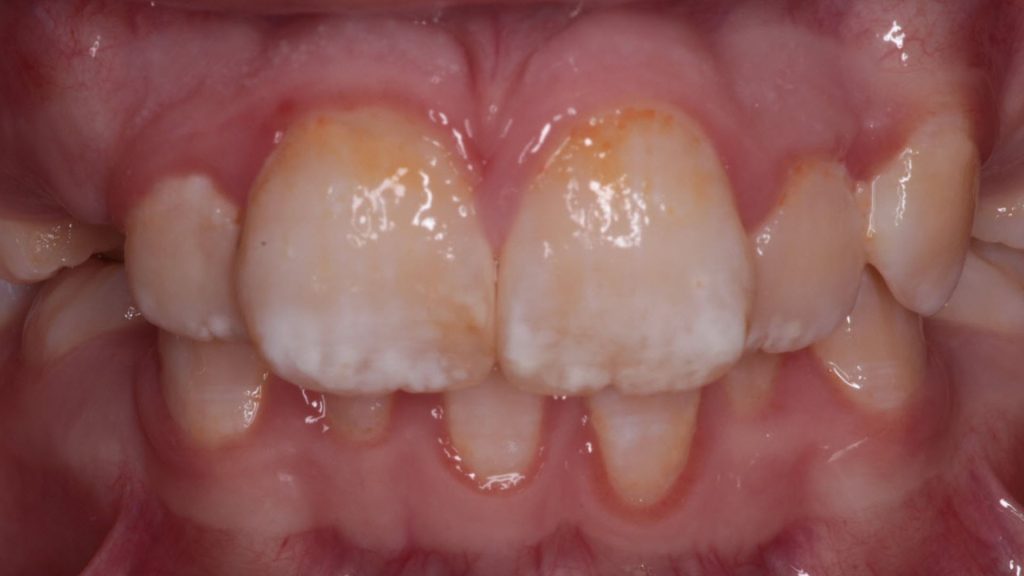Does Your Child Have Chalky Teeth? Is their surface discolored, harsh, or chalky? If that’s the case, your kid could have a problem called chalky teeth. As a parent, it’s important to understand this illness and its possible influence on your child’s dental health. Recognizing this issue can help you safeguard your child’s teeth. Let’s look at chalky teeth and how you may improve your child’s dental health.
What Are Chalky Teeth?


The condition known colloquially as “chalky teeth” refers to teeth that have lost their regular enamel thickness, have become transparent, and are readily broken. This problem is called “enamel hypoplasia” in English, which means that the enamel is weakened or missing. There are several potential causes of enamel hypoplasia:
- Traumatized teeth throughout development.
- Too much fluoride exposure during tooth formation.
- Celiac, urethritis, inflammatory bowel, and chronic kidney diseases.
In a nutshell, sensitivity and decay are both exacerbated by bad and brittle teeth. For early identification and treatment of dental issues, brushing twice a day, using fluoride toothpaste, and seeing your dentist regularly are crucial.
Does Your Child Have Chalky Teeth?


Chalky teeth, also called enamel hypoplasia, can cause children to have oral problems that are scary. Knowing these signs helps parents and caregivers understand their child’s mouth health and find ways to deal with the problem. Here are some common signs of chalky teeth that you should be aware of so you can take care of your child’s smile properly:
- Irregular color: The teeth are yellowed or discolored.
- Unsmooth tooth surface: Loss of enamel makes the tooth surface rough.
- Increased sensitivity: Chalky teeth create sensitivity to hot, cold, and sweet meals, making youngsters uncomfortable.
- Vulnerable: Teeth deteriorate when enamel weakens.
- Change in shape: Teeth may become deformed or uneven if enamel is damaged or lost.
- Vulnerable to structural changes: Chalky teeth may weaken teeth, making them more likely to shatter.
So, if you or your kid are experiencing any of the aforementioned signs, it’s best to get a dental checkup as soon as possible. Your doctor will suggest the right treatment to ease your complaints and protect your mouth health.
How To Diagnose Chalky Teeth?
If your child has “chalky teeth” (enamel hypoplasia), get a professional diagnosis. A complete diagnostic assessment by a dentist can establish the cause and optimum treatment. The dentist may use these common diagnostic methods to assess your child’s dental health:
Step 1: Clinical Examination
First, the dentist will examine the child’s teeth and learn about their symptoms and medical history. They will examine the color, surface, and structure of the teeth to discover enamel loss.
Step 2: Dental X-ray
Then, your dentist may advise you to undergo X-rays of your teeth to monitor their growth and inspect the internal structure. This detects enamel flaws and chalky teeth.
Step 3: Health History Analysis
Finally, your dentist may review your child’s medical history with you in order to detect enamel-damaging factors such as sickness, trauma, dyes, or fluorine. Finally, the dentist will have the information they need to identify chalky teeth and provide effective treatment. Most importantly, contact a dentist and learn how to properly care for your teeth to protect your child’s dental health.
Treatment For Chalky Teeth
There are several treatment methods for chalky teeth that may improve dental health and a child’s quality of life. These treatments help maintain and treat chalky teeth, from fluoride to tooth sensitivity. Here are some typical therapy alternatives to consider if you have this issue:
- Fluoride Therapy: Commonly used to stimulate enamel remineralization, fluoride therapy has been around for quite some time. Your dentist may put a film of fluoride on the surface of your teeth to strengthen the enamel and lessen discomfort.
- Use Sealants: The powdery enamel on your teeth makes them more susceptible to decay, chipping, and cracking. Sealants may protect tooth enamel from toxic substances and minimize damage.
- Dietary adjustments: Making sure your kid eats a balanced and nutritious diet may assist enhance his or her oral health. Reduce your consumption of sugary meals and fizzy beverages while increasing your diet of veggies, fruits, and calcium sources.
- Treating tooth sensitivity: Your dentist may suggest a potassium nitrate toothpaste or a desensitizing pad for gritty teeth.
- Cosmetic treatment: A dentist may offer aesthetic treatments such as veneers or dental restorations to enhance the look in more severe situations when chalky teeth pose substantial cosmetic difficulties.
Most crucial, talk to your dentist about your child’s treatment. Your child’s oral health requires a regular dental care regimen and preventative program.
How to Avoid Having Chalky Teeth?
It is difficult to feel anything except worry and anxiety when looking at a child’s chalky teeth. However, let’s work together to find out how to safeguard the oral health of youngsters. We may lower our risk of chalky teeth and regain pleasure and happiness by practicing good dental hygiene, avoiding dangerous drugs, and eating a balanced diet. Our darling’s confidence. Let’s start oral prevention and care together and see your child’s teeth grow strong and brilliant:
- Proper dental care: Start kids out with appropriate tooth brushing. Brush your child’s teeth twice a day for two minutes. Use age-appropriate fluoride toothpaste.
- Limit exposure to harmful substances: You should cut down on your consumption of sugary beverages, colored meals, and colored foods. This makes it less likely that something bad will happen to the tooth enamel.
- Ensure balanced nutrition: A calcium, vitamin D, and another dental enamel-building supplement. Give your youngster milk, yogurt, salmon, green veggies, and nuts.
- Routine check-ups: Make it a point to check and clean your child’s teeth regularly. Your child’s dentist can find problems with the teeth early and treat them.
- Use fluoride: Use fluoride toothpaste and mouthwash if your dentist recommends it. In a nutshell, fluoride stops teeth from becoming chalky and aids in the formation of dental enamel.
- Inspire children: Help youngsters understand the importance of maintaining their teeth and gums and developing good habits. It is critical to begin oral hygiene habits early and to include children in the process.
Remember that if you take precautions to keep your child’s teeth from getting chalky, you may be able to avoid this problem entirely. Additionally, see your dentist for suggestions suited to your child’s individual requirements.
Conclusion


In life, your child’s health is one of the most important things. And teeth are not only important for eating and speaking, but they are also a big part of a child’s smile. That is why it is crucial to safeguard your child’s teeth and provide them with the best care possible. Your toddler may have chalky teeth. They’re unsightly and bad for your child’s teeth.
Therefore, it is crucial to identify and treat cases with chalky teeth. At Spring Orchid Dental Clinic, we are dedicated to giving high-quality, skilled dental care, especially to children. We realize that a trip to the dentist may cause anxiety and tension for the whole family.
The Children’s Dental Benefits Plan (CDBS) was designed to provide you and your family both. We prioritize regular check-ups for children at Spring Orchid Dental Clinic. We can discover any abnormalities early and conduct preventative and treatment actions because of an accurate and timely examination of children’s oral health.
FAQs
What Cause Chalky Teeth In Child?
A disorder called enamel hypoplasia can make children’s teeth look chalky. Enamel hypoplasia happens when the growth of tooth enamel is interrupted, leaving a thin or missing layer of enamel. Many reasons may cause chalky teeth in youngsters:
- Genetic factors: Some children have a hereditary susceptibility to enamel hypoplasia, making them more likely to develop chalky teeth.
- Nutritional deficiencies: Early childhood malnutrition may cause enamel hypoplasia. Vitamin A, C, D, calcium, and phosphorus deficiencies may cause this.
- Illness or infection during tooth development: High fever, measles, mumps, or chickenpox during tooth formation might cause chalky teeth.
- Medications and environmental factors: Certain antibiotics and antihistamines may influence tooth enamel production. Environmental pollutants such as excessive fluoride or chemicals may cause enamel hypoplasia.
- Premature birth or low birth weight: Premature or low-birth-weight babies may have chalky teeth due to undeveloped enamel.
It’s crucial to note that chalky teeth may vary in severity, with some youngsters having moderate discoloration and others having more significant enamel deficiencies. If you think your kid has chalky teeth, see a pediatric dentist for diagnosis, treatment, and prevention.
Do Chalky Teeth Fade Away On Their Own?
No, it’s not. There is no natural way for chalky teeth to mend or recover. Once the enamel has formed with flaws, it can’t get better on its own or be fixed. However, adequate dental treatment and preventative measures may help control the illness and reduce its influence on oral health.
Can Baby Teeth Get Chalky Teeth?
Yes, chalky teeth can even happen to baby teeth. If you have chalky teeth, it’s because your enamel hasn’t finished developing, so it’s thin or uneven. Thus, it is possible for both primary and permanent teeth to be affected.





